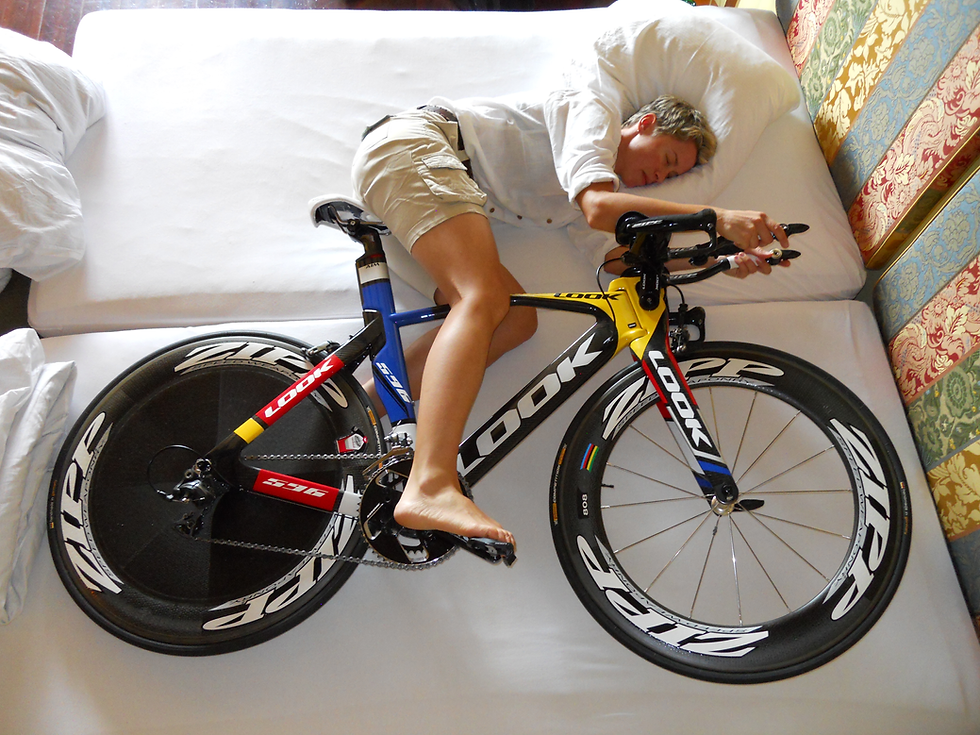After the Race... Now What?
- KC Northup

- May 23, 2025
- 3 min read
Updated: Oct 1, 2025
How to deal with the physical fatigue and emotional whiplash athletes experience after a big race.
Whether this was the one big race you'd been working towards for months or even years, or you're a frequent competitor that just finished a big "A-Race", we

all feel that post race hangover. It's a mix of the physical fatigue from the race itself, the emotional fatigue from the stresses of prepping, racing, and accepting the finality of the finish (or DNF), and the mental fatigue resulting in the sudden disruption to a training routine that, while possibly grueling, was constant, predictable, and provided both endorphins and a sense of purpose. One day, one event, one finish line, and this all hits you all at once. How do you cope without falling into the post race blues?
Let's handle the physical, first. As a rule of thumb, for every hour you race you'll need AT LEAST that many days to recover after the event. This is the minimum, and for most athletes it's more, even possibly double that amount. So, if you do a 70.3 and it takes you 6 hours to finish, it's probably going to take you between 6-12 days to fully recover. You certainly have some influence over how long it takes, though. First, your muscles need to rebuild after being stressed for hours.

You need carbs and protein (3:1 ratio) ASAP after the finish and in the hours and days following and also need to rehydrate. Add some BCAAs, namely glutamine, as well to speed up the process. Sleep- this is when most muscle reparation happens- you're going to need lots in the days following the race. Make time for extra sleep for several days following a big race. You can also use tools like compression boots, rollers, cryo, and other recovery therapies, but sleep and food are the keys. Once the initial soreness has subsided enough to do light workouts, start to add in short low effort biking, swimming, yoga, or walking workouts to flush out the lactic acid. Once these workouts start to feel "normal" and not overly difficult, you can start to ramp back into regular training, gradually.
But what about the mental and emotional side of things? If your big race was your first 70.3, a crazy ultramarathon, or an "A-Race" Ironman, there's a good chance you life has largely been revolving around training and preparing for this one event for some time. All that build up, all that work, all that anticipation, and

now it's over. Regardless of whether it went perfectly or terribly, athletes are often left feeling a bit lost afterwards. The best remedy we've found for this: plan for it! You know it's coming, so make a plan before it hits. You've probably fallen behind on other things in life while you were focused on training- time with family, house projects, personal appointments, work projects- whatever it is think through it and make yourself a prioritized to-do list for once the event is over. As soon as the event is over, get at it! This will keep you from falling into bad habits or feeling lost after the event. Then, as soon as you're feeling rested, start working out again. It doesn't have to be so structured or disciplined, but don't waste all the fitness you gained. It doesn't take much to maintain it, you owe it to yourself to keep at it and continue to provide yourself those lovely endorphins. Lastly, if you're planning to continue with additional events after the big one, sign up for the next before you complete the first. This will hlep you to get back to training quickly!







Comments